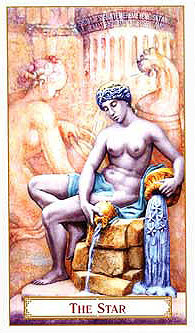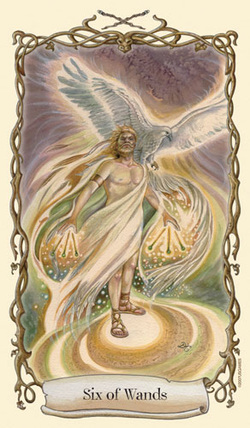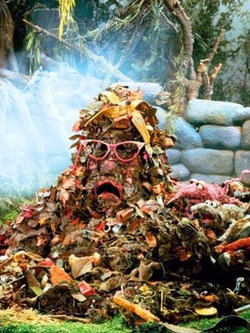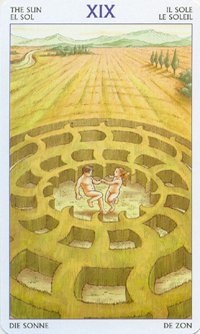 The Star is one of my favorite cards. And I'm always pleasantly surprised that it doesn't have more people resisting it like The Tower, or giving it layers of meaning like The Devil or Death. It's a card about faith, hope, and Divine guidance, and yet everyone's as delighted to see it as me.
Okay, I know that sounds ridiculous. Why would people be opposed to the promise of good things to come?
Well, hope is a challenging thing. Hell, the President of the United States made it a campaign topic. It suggests the Divine or angels, an end to struggle, the light at the end of the tunnel. That's tough sometimes. When you're sad or overwhelmed, being told there's a way out can be frightening. It suggests changes that might be large and just as scary. It asks for you to take risks, make adjustments, and be ready to entertain second chances.
The Star follows The Devil, a card about being trapped by harmful patterns and self-defeating behaviors, and The Tower, a card about breaking down the crumbling foundations to rebuild new things. It's a hope that emerges from tough, painful circumstances, a guidepost that points the way home. And the beauty of The Star? Is that all of these things are steps on the road to something amazing. The World, with its completion of a cycle and feeling of having it all, is only four steps away.
In a way, The Star is a lot like a good Tarot reading. If you're feeling confused, lonely, or just plain in need of clarity, it can show you the road ahead. It can give you new insights on how you change your life. It's been delivered to you at a time you can handle it, when you're capable of making the change - but the change is up to you. It's a responsibility that is purely in your hands.
And making that change yourself, as scary as it can be, will make the conclusion all the more powerful and satisfying.
This week's deck is the Tarot of Prague by Alex Ukolov & Karen Mahony, a collage of photographs from Prague's art and architecture. I love the pensive, thoughtful look of the figure pouring the jars, and the little stars captured in the water. Divine love and new possibilities are wellsprings that never truly run dry, not if we know how to access them. But we do need to remember to take a drink.
 This week's card is from the Fantastical Creatures Tarot by DJ Conway and Lisa Hunt - and Ms. Hunt always creates some of the most beautifully illustrated decks I've ever seen. In this case it's a deck about mythical and mystical creatures, focused on communication with these powerful forces. Whether you believe this is a literal possibility or not, it adds another layer to the richness and beauty of the Tarot.
The Six of Wands is illustrated by the White Eagle of Zeus, a messenger of the gods. The glowing wands emerging from Zeue's hands seem to indicate the power and energy of the Wands suit, while the eagle spreads its wings, about to set off to communicate with mortals and allow them to touch the gods.
It's an interesting idea when compared with the image of the Rider-Waite deck: a man on horseback proclaiming his victory, wreath and all. It's as if our victories get us closer to the Divine itself. Acknowledging our power, our ability to achieve the things we desire, makes us feel like we've touched something godly. Or isn't that the reason for the legend about the parades in Rome, where there'd be someone asked to stand next to the victorious general and whisper in his ear, "Remember, thou art mortal."
The Six of Wands is numbered six of ten. It's only in the middle of the path. But I don't think that's because the next steps are the fall of mortal men. I don't even think it's because in the Rider-Waite, the Ten of Wands is someone being crushed under the burden of too many responsibilities and expectations.
I think that achieving all we are gets us closer to the Divine - but really, we were divine already. Our achievement brings us in communion with the gods because we remember our ability to manifest wonderful things. We remember our connection to a world that works with us, not against us.
That may seem materialistic, selfish even. But only if you think the point of achievement is to get "stuff", money, goods, or accolades that have no meaning beyond the idea that you have it. Our deepest victories aren't the simple idea of money in our bank accounts, or a trophy on a wall. They're how we worked to achieve that thing, something we'd never imagined to be possible before. They're how money is one road to more time with our families, or more freedom to discover and grow beyond our current limitations.
Who's to say our victory has to be material things or accomplishments? Our best achievements are inside us, discovering all we're capable of, all we can grow to be. And if that's not touching the Divine, I don't know what is.
 When talking to a friend about some tough memories, she said something to me that I have the feeling is going to stick with me a long time.
"What's the story you're telling behind that?"
We all have stories, she explained. Not the stories that really happened, the ones that are actually a part of our history. But the stories we tell ourselves, the ones that come up in our memories and play tricks on us.
"I wasn't good enough, so I failed."
"Their lives are perfect; I wish I was like them."
"I ruined everything, and now they hate me."
Maybe, as an anxious or sensitive person, you actually say it in those words. Maybe you don't realize that's the way you see it, but you might as well be saying it in the back of your mind. Our lives go through a filter, where we see the circumstances as a play - and the ending is whatever we decide to believe about ourselves. And often, the impressions we leave are strong and can be unforgiving.
Look back over the stories you tell yourself, and find one that stands out as an old regret. Then rewrite it. Pick out the parts where you did well, and the parts where you could have done better. Then rewrite the ending. Create the final act where you release your pain, climb the next hurdle, prove yourself and believe you deserve it.
You're already writing your story. Empowerment just means consciously creating a new chapter.
 There's so much more to intuitive thinking than just psychic readings and spirit guides. While that's the end goal, developing yourself and your mind so you can be more in touch with the universe, here's a few things developing your intuition can teach you along the way. (image is "Intuition" by Bente Hansen) - Pay attention. The world has so much to say to you if you look around and see what it's telling you. You have so much to say to you, if you only tune in. If you learn to listen, you'll be open to more points of view and more possibilities.
- Slow down. We're so wrapped up in the world around us that we don't always take time to really see and feel what we're doing. Slowing down puts us in touch with our own bodies, with the things we want and need - which means we can take care of ourselves in a more profound way.
- You know more than you think you do. Gurus can point you in the right direction, and you can learn a lot from an outside perspective, but ultimately you're just as in touch with inner wisdom as everyone else. If you believe you'll see results from trusting your instincts, then you will, whether that's achieving your heart's desire or learning more about yourself to make it happen.
- The world is out to give you good things. Really. Even when everything is going horribly. There are no "bad" cards in Tarot, and there are very few 100% "bad" events in life. Our mistakes and our tragedies are tools to learning and developing into something greater than we are. Listening to your intuition means you have an internal guide all the time telling you how and why that is, and it makes the true lessons of the moment far easier to access and believe.
- You are magic. Listen to your intuition, and you'll realize all the miraculous things you've seen in movies are already part of you. As you unlock more and more of your own psychic potential, you'll realize that all the incredible things you ever wanted to do were already there to begin with, waiting for you to bring them out. Will you have natural talent to be an expert at everything? No. But you'll have access to it - to learning lessons from it, tapping into it, and growing from it. And you can make anything you want a part of the magic of your world.
"And you who seek to know Me, know that the seeking and yearning will avail you not, unless you know the Mystery: for if that which you seek, you find not within yourself, you will never find it without.
For behold, I have been with you from the beginning, and I am That which is attained at the end of desire." - The Charge of the Goddess, Doreen Valiente
 I've been rewatching a lot of Fraggle Rock lately, since my girlfriend with a decidedly HBO-deprived childhood has never seen it. Yeah, yeah, I'm a grown-up and I'm supposed to be above these things. But screw my credibility. There's a lot of simple wisdom in kids' stuff that we don't really remember to touch as adults, and it's Jim Henson, creator of the Muppets and Sesame Street, which should say it all.
And Fraggle Rock? Has to be the most pagan show I've ever seen. A living, breathing system of caves that teach about the interconnectedness of life? A festival where you compose tributes to the full moon? And if you want to teach a newly-minted teenaged Wiccan about why she can't be initiated just yet, just show her "Mokey and the Minstrels".
Then there's Marjory the Trash Heap, the "all-knowing" oracle who pings me quite a bit for obvious reasons. She demonstrates some genuine power and insight towards the end of the series, but mainly Marjory is kind of a shyster - someone who gives you not-quite-groundbreaking sayings or junk objects in the form of talismans. She does claim to be all-knowing, but the Trash Heap doesn't really take payment for her services. She's more than happy to dispense a little bit of cryptic practicality, watch the Fraggles mistake it for deep wisdom, and then let them work out their own problems with this new bit of direction. Her ultimate goal is the goal of all great oracles: to no longer be needed.
And often, the magic works. Anxious Boober feels a surge of courage when clutching a bottlecap inscribed with the words "no deposit, no return." Red and Wembley learn the charm of spilling a bottle of milk and pointedly not crying over it, which gives them the confidence to finally stop worrying and make a plan.
What Fraggle Rock knows, and what Tarot readers know, is that objects and sayings aren't the important thing. There are literal "junk oracles", where you draw discarded odds and ends out of a bag and make observations based on what you find/the meanings you attach. And they're much the same as Tarot's lovely, inspiring, and extremely subjective art. The power is in the reader, whether that's intuition or just plain common sense. It connects us to the magic of the world, taps us into something bigger.
The insights from divination are personal insights, a little nudge in the right direction. They encourage someone to understand the situation and get moving, with the confidence that they knew a little more about themselves and their path than they did half an hour ago. There's a tremendous, often magical power in that. And the greatest power of all, of course, is that you can put a little of your focus and intention into the world - and get a great deal back out of it, no matter what tools you use.
"No deposit, no return."
 The Sun is one of my favorite cards, because it's pure joy. Simple, uncomplicated. Your inner light is burning like a torch, and the whole world is ahead of you.
It's no wonder there's often children in the imagery (like here, in the fascinating 78 Doors Tarot), because rarely do we have that attitude of "I can do anything" once we've grown up.
Yes, that's partly because children think they can do anything without the planning, focus, and learning from past mistakes. But it's partly because after a certain age, we don't really get the room.
We do a lot of things because we "have to." Because that's how it's done - jobs that bore us but bring in the money, holidays with family we hate, wearing uncomfortable shoes because they give us a certain "image." We're told we need to do these things to be succesful or to have respect.
And pursuing our hobbies and loves? Taking a vacation? Actually, gasp, making money? That's selfish. It means you aren't serving other people, and what they need. You ought to be ashamed.
Somewhere along the way, our society decided that misery was a sign of responsibility. That we couldn't follow our bliss without sacrificing everyone else along the way. And we couldn't be more wrong. The bliss we pursue, and the stability of the people and things we love, are completely connected.
There's a scene in the fabulous satire "Good Omens", where the demon Crowley talks about designing an overly-complicated highway system. He says that all he needs is some backed-up traffic. Because that means a thousand people go home stressed out and angry. They take it out on their spouse or significant other. Their spouse takes it out on their kids. The kids yell at the dog.
When we're dissatisfied with our lives, an aura of stress and frustration spreads out, ripples in a pond. And those little pebbles of anxiety do more damage than one person's bad decisions ever could. It means that our whole world is the result of our collective self-love. The way you feel, the story you tell about your life, sets the stage for the whole world. Being happy is one of the most unselfish things you can do.
Don't get me wrong - I'm not shaming someone who has, say, clinical depression. But it's all the more important, when you need to make it one day at a time, to imagine something you want even a little better. Because at our highest and at our lowest, a little goes a long way.
I'm not saying to neglect everyone else's feelings. No man is an island. How happy will you be until the people you love are happy too? Make them a part of your dreams - but there needs to be room for you.
Imagine the happiest possible future for yourself. What does that look like? And more importantly: why? Even if you imagine yourself zoned out on the couch watching TV all day, what about that appeals to you?
A love of entertainment? Take that love, study it, and turn it into a part-time stint as a critic.
A lack of responsibility? That's harder. How about this: craft a world where responsibility feels that effortless.
The more you listen to your "inner light" as a possible reality, instead of a hypothetical, the more you find out about yourself. The more you can craft yourself into the best possible person you can be, with the best possible life for you. That's our real job. Our constant learning, growing, and blossoming is what we'll need when we're six, sixty, or six hundred. It's not a destination, it's a journey.
So let's get to work.
|






 RSS Feed
RSS Feed

